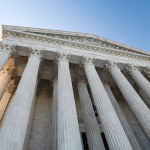February 28, 2022
By Timothy Sandefur
The U.S. Supreme Court announced today that it will review the constitutionality of the Indian Child Welfare Act (ICWA), the 1978 law that blocks states from protecting abused or neglected “Indian children.” ICWA defines the term “Indian children” based on a child’s biological ancestry—and effectively prohibits their adoption by adults of different races. The case, called Brackeen v. Haaland, was brought by several state governments as well as by would-be adoptive parents, who stand ready to provide safe, loving homes for Native children, but who were told no, because they are not “Indian.”
ICWA has been the focus of the Goldwater Institute’s Equal Protection for Indian Children initiative—Goldwater, in fact, has done more work on this issue than any other group nationwide—and today’s announcement is a welcome development, especially given that in the four decades since ICWA was passed, the Supreme Court has only ever decided two cases involving the act.
ICWA was written with good intentions: to end policies of previous decades whereby state governments sometimes took children from Indian parents without good reason. But ICWA went too far in the other direction by restricting the ability of state child services officials to protect kids from abusive families if those kids fit the biological profile of “Indian.” Unlike other laws that apply to people based on their membership in a tribe, ICWA applies to children who are either tribal members or who are “eligible” for membership, based exclusively on their biological ancestry. As a result, a child with a distant Native ancestor is subject to a separate—and less protective—set of rules than apply to children who are white, black, Asian, or Hispanic. And that’s true even if the child has no cultural, social, religious, linguistic, or political connection to a tribe.
ICWA’s rules are less protective because—to cite just one example—they require state officials to establish more evidence of abuse before they can protect “Indian children” than is the case with non-“Indian” children. If social services have evidence that a white child is being harmed, they can protect that child so long as there is “clear and convincing evidence” of abuse. But if the child is biologically eligible for tribal membership—even if he or she isn’t actually a tribal member—then they must provide evidence “beyond a reasonable doubt,” based on the testimony of expert witnesses.
Thus, ICWA doesn’t just violate constitutional rules against race-based discrimination, but it also violates longstanding rules about the different powers of state and federal governments. State governments have always been responsible for child protection and family law. But with ICWA, Congress ordered states to enforce federal laws—something Congress typically can’t do. It even ordered states to interpret their own state laws differently—something Congress has never done before.
In the Brackeen lawsuit, a strongly divided panel of judges on the Fifth Circuit Court of Appeals held that ICWA violates federalism rules by commanding states to implement federal laws, but fell short of declaring the law unconstitutional because of its race-based provisions. As a result, everyone involved in the case (the prospective adoptive parents, the federal government, tribal governments, and state governments) have all asked the U.S. Supreme Court to address the issue. The Goldwater Institute, along with the Cato Institute, filed this brief, urging the Court to take up the matter.
You can learn more about ICWA here, and view the many other ICWA lawsuits we’ve been involved with here.
Timothy Sandefur is the Vice President for Litigation at the Goldwater Institute.









